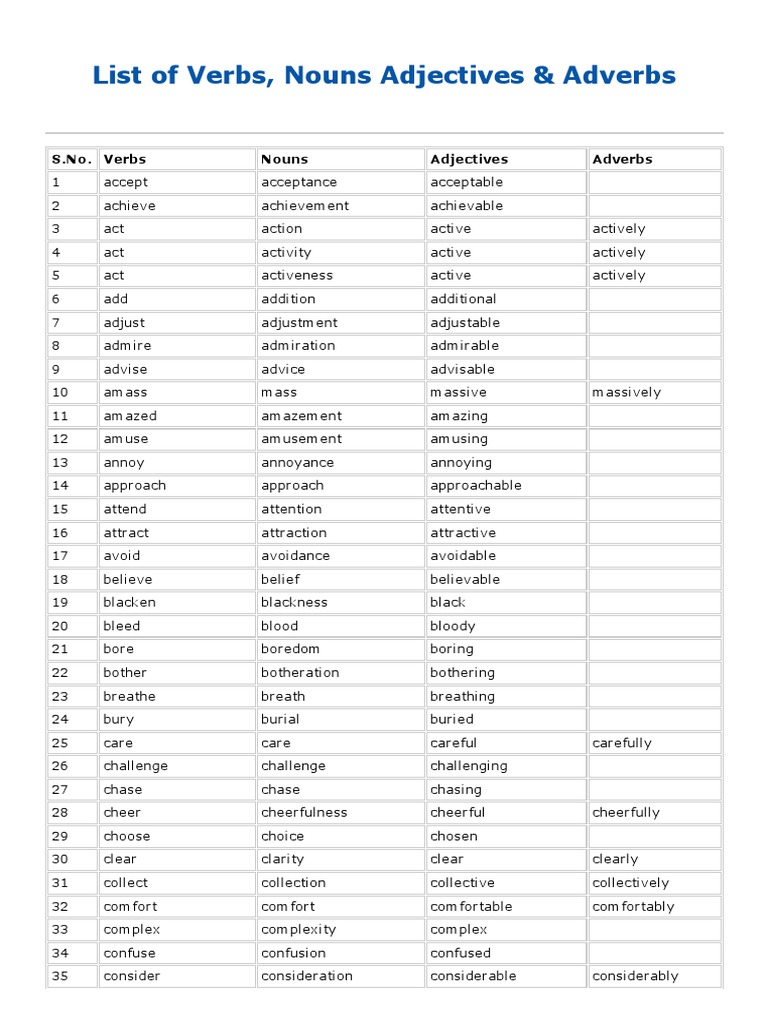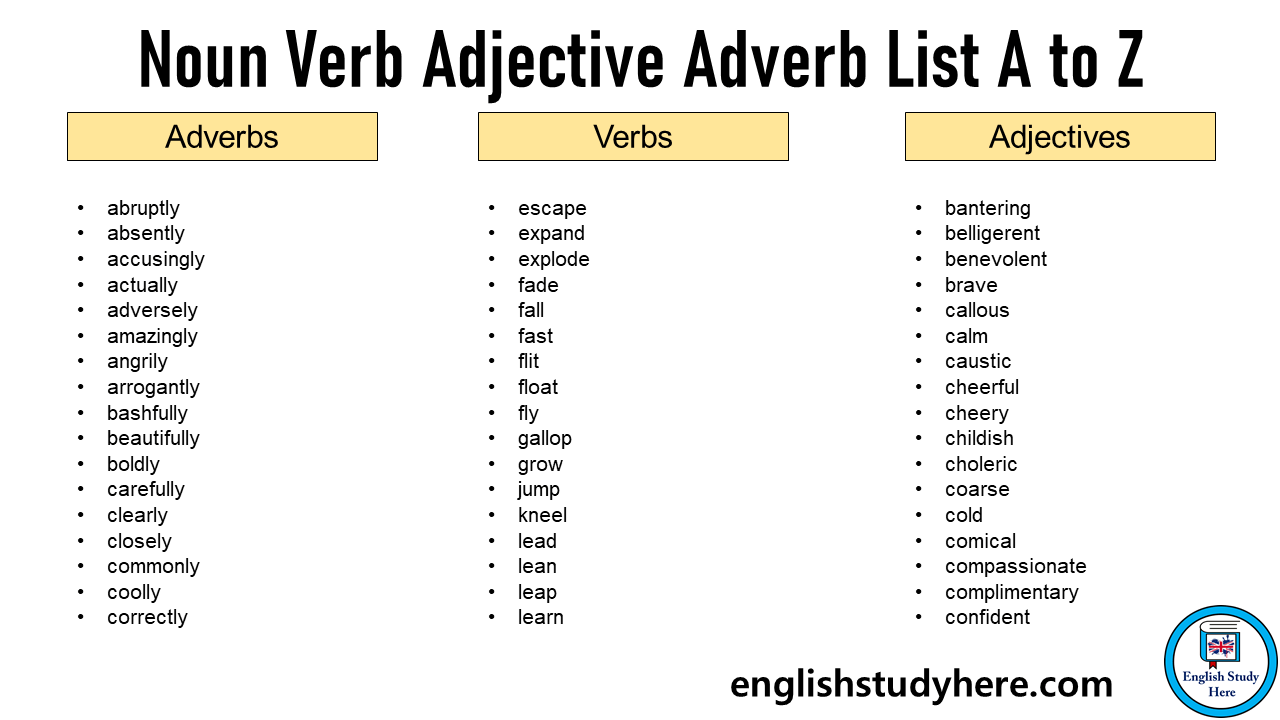Have you ever found yourself struggling to express your thoughts clearly? Do you ever feel like your writing lacks impact, or your conversations feel dull and lifeless? Perhaps the answer lies in understanding the fundamental building blocks of language: verbs, nouns, adjectives, and adverbs.

Image: www.scribd.com
These four parts of speech form the very essence of our communication, allowing us to paint vivid pictures, share complex ideas, and connect with others on a deeper level. By mastering their use, we can unlock a world of possibilities in our writing, speaking, and overall expression.
Verbs: The Action Heroes of Language
Verbs are the dynamic forces that drive our sentences. They depict actions, states of being, or occurrences, infusing our language with movement and vitality. Imagine a world without verbs – static, lifeless, and utterly uneventful!
Verbs can be classified into various types, including:
- Action Verbs: These verbs express a physical or mental action.
- Example: The cat ran across the yard.
- Linking Verbs: These verbs connect the subject to a noun or adjective that renames or describes it.
- Example: The sky is blue.
- Helping Verbs: These verbs precede another verb, adding nuance and complexity to the action.
- Example: She will be going to the party.
Nouns: The Foundation of Meaning
Nouns are the names of people, places, things, or ideas. They provide the concrete and abstract subjects of our sentences, grounding our thoughts and providing a framework for our writing.
Various types of nouns exist, each serving a unique purpose:
- Common Nouns: These refer to general categories of things.
- Example: cat, tree, house.
- Proper Nouns: These refer to specific people, places, or things, and are always capitalized.
- Example: John, Paris, Amazon.
- Concrete Nouns: These refer to tangible objects that can be perceived by the senses.
- Example: apple, chair, river.
- Abstract Nouns: These refer to intangible concepts or ideas.
- Example: love, justice, freedom.
Adjectives: Adding Color and Detail
Adjectives are the words that enrich our language, adding vibrancy, depth, and specificity. They modify nouns and pronouns, describing their characteristics, qualities, or states. Imagine a world without adjectives – bland, colorless, and devoid of any interesting detail!
Think of adjectives as descriptive lenses:
- Descriptive Adjectives: These provide vivid imagery, evoking specific senses.
- Example: He wore a shiny red leather jacket.
- Quantitative Adjectives: These describe amounts or quantities.
- Example: They had three puppies.
- Possessive Adjectives: These show ownership.
- Example: Their new car is beautiful.

Image: englishstudyhere.com
Adverbs: Enhancing Action and Description
Adverbs are the modifiers of verbs, adjectives, and other adverbs, adding nuance, detail, and precision to our communication. They answer questions like “how,” “when,” “where,” and “to what extent.”
Adverbs provide an essential layer of information, often painting a more comprehensive and evocative picture of actions and descriptions:
- Manner Adverbs: These describe how something is done.
- Example: He ran quickly away.
- Time Adverbs: These describe when something happens.
- Example: She will arrive later.
- Place Adverbs: These describe where something happens.
- Example: The bird sat there.
- Degree Adverbs: These describe to what extent something happens.
- Example: The movie was extremely funny.
Using Verbs, Nouns, Adjectives, and Adverbs Effectively
Now that we have explored the roles of these fundamental parts of speech, let’s dive into some practical tips for utilizing them effectively:
- Use strong verbs: Choose active verbs that create a clear and dynamic image. Avoid passive verbs that can make your writing sound weak and lifeless. (e.g., “The ball was hit by the batter” vs. “The batter hit the ball”).
- Choose specific nouns: Instead of general, vague nouns, use specific, concrete nouns that make your writing more interesting and engaging. (e.g., “bird” vs. “red robin”).
- Use descriptive adjectives sparingly: While adjectives paint pictures, too many can clutter your writing. Choose adjectives carefully to emphasize important details and create a specific impression.
- Choose adverbs with care: Adverbs are powerful tools, but they can also be overused. Use them judiciously to enhance meaning and avoid redundancy.
Expert Insights for Mastering Language
“The way we use language can profoundly affect the way we think,” shares Dr. Susan Pinker, renowned cognitive psychologist and author. “By understanding the different parts of speech, we can cultivate a more nuanced and articulate form of expression.”
“The power of language lies in its ability to connect, inspire, and inform,” adds Dr. James Pennebaker, a leading psychologist and expert in language and emotion. “By mastering the fundamentals, we can create a richer and more impactful experience for ourselves and those around us.”
Actionable Tips for Everyday Use
- Pay attention to the language around you: Observe how others use verbs, nouns, adjectives, and adverbs in their writing and speech.
- Practice intentional writing: Write a short story or poem using specific words and phrases to enhance imagery and depth.
- Engage in conversations with purpose: Pay attention to the language you use in everyday conversations and strive to communicate with clarity and precision.
List Of Verbs Nouns Adjectives And Adverbs
Conclusion
By understanding the unique roles of verbs, nouns, adjectives, and adverbs, we can unleash our full potential as communicators. These building blocks empower us to create vivid images, express complex ideas, and connect with others on a deeper level. So embrace the power of language, cultivate your mastery of its elements, and watch your communication flourish. Go forth, write, speak, and share your thoughts with the world!






